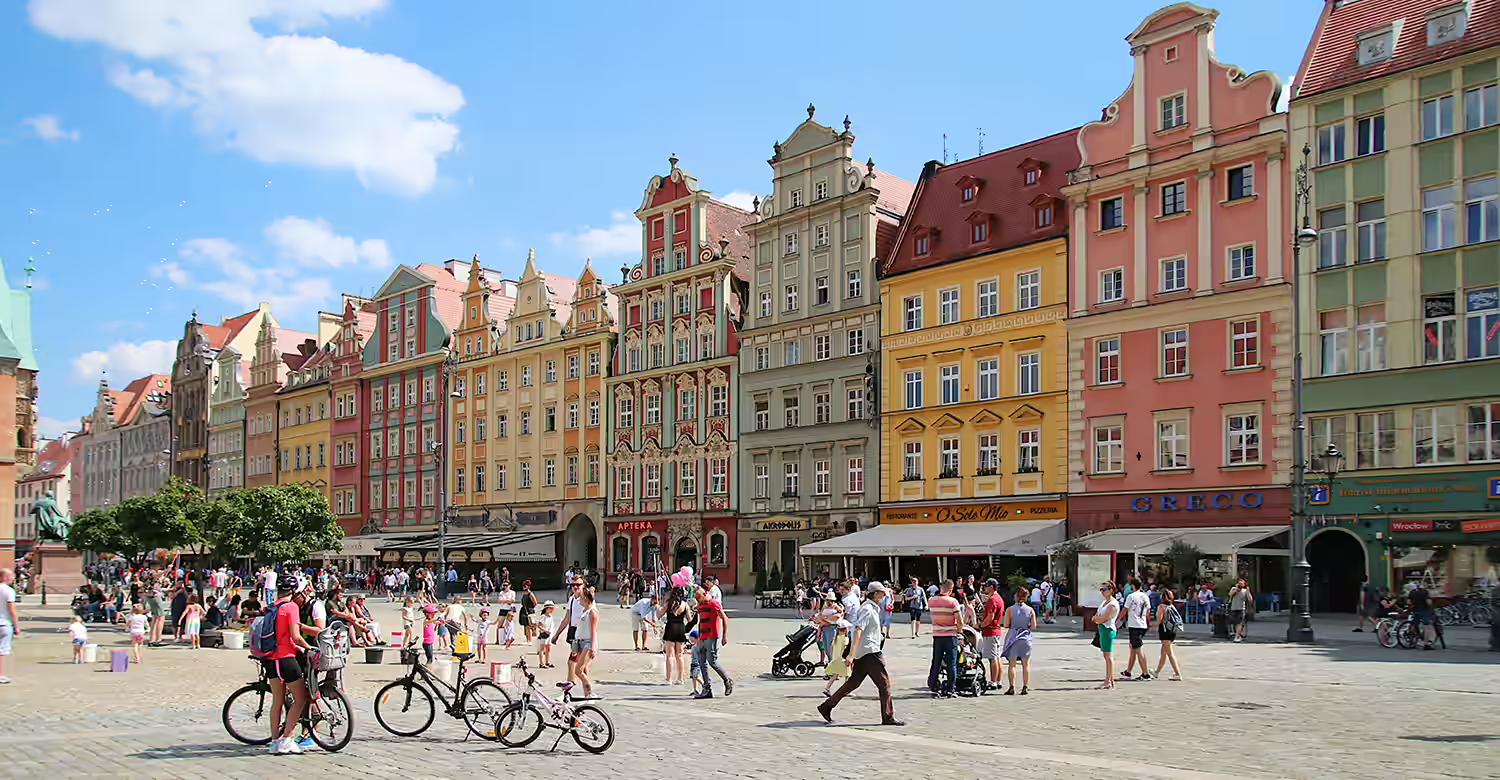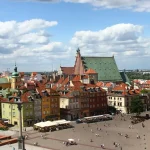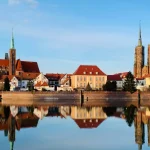
Complete guide to studying in Poland
Everything you need to know about becoming an international student in Poland
Five top reasons to study in Poland
- Affordable tuition fees – Poland offers some of the lowest tuition costs in Europe, with public university fees for international students typically ranging from €2,000-€6,000 per year.
- Vibrant student cities – From historic Kraków and coastal Gdańsk to dynamic Warsaw, Poland’s cities combine culture, history and modern student life.
- High-quality education – With centuries-old universities like Jagiellonian University and modern research institutions, Polish degrees are recognised across Europe and beyond.
- Growing range of English-taught programmes – Over 800 degree programmes are available in English, particularly at the master’s level, making Poland accessible to students worldwide.
- Strong career opportunities – Poland’s expanding economy and demand for skilled workers in IT, engineering, healthcare and business create excellent job prospects for graduates.
A quick introduction to Poland
Poland is a large country located in Central Europe, sharing borders with seven nations including Germany, the Czech Republic, Slovakia, Ukraine, Belarus, Lithuania and Russia.
With a population of around 38 million, it is the fifth most populous member state of the European Union. Its capital, Warsaw, is a dynamic city that reflects both the country’s historic heritage and modern economic growth.
Visitors to Poland can enjoy a wide range of landscapes, from the sandy beaches of the Baltic coast, to the picturesque Masurian Lake District, vast plains and forests, and the dramatic mountain ranges of the Tatras and Carpathians.
Students choosing to study in Poland will benefit from a high quality of life combined with relatively affordable costs compared to many Western European countries.
Poland is a safe and welcoming country with a strong emphasis on education, healthcare and cultural life, making it an increasingly attractive study destination.
Articles related to studying in PolandPoland’s population is becoming more diverse, with growing numbers of international students joining its universities each year. In 2023, more than 100,000 foreign students were enrolled, representing over 180 different countries of origin.
The official language of Poland is Polish, spoken by the majority of the population. However, a wide range of degree programmes are available in English, particularly at the master’s level, which makes the country accessible to international students who do not speak Polish.
Poland is governed by a national government and is divided into 16 administrative regions known as voivodeships. Universities are overseen by the Ministry of Education and Science, and students can expect consistent standards of quality across the country.
For you as an international student, the academic quality of your experience will be high regardless of where you choose to study, but your lifestyle may differ depending on whether you study in a historic university city such as Kraków or Lublin, a modern capital like Warsaw, or a coastal hub such as Gdańsk.
Poland’s higher education system
Poland’s higher education system follows the three-cycle degree structure of the European Higher Education Area.
This means that universities offer a full range of study options at bachelor, master and doctoral levels and qualifications are recognised across Europe and beyond.
Most Polish universities are public institutions, receiving government funding to ensure affordable tuition fees for both domestic and international students.
Alongside these are private universities and specialist institutions, particularly strong in fields such as business, law and social sciences.
Universities in Poland generally fall into two categories:
Universities of Applied Sciences (Uczelnie zawodowe)
These institutions focus on equipping students with the professional skills and practical training needed for the workplace.
Teaching is career-oriented, and many programmes include internships or work placements as an integral part of the curriculum.
If you are looking for a more hands-on style of education that prepares you directly for a profession, a University of Applied Sciences could be the right choice. Graduates often go straight into employment in their chosen fields.
Academic and Research Universities (Uniwersytety akademickie)
Research universities in Poland place greater emphasis on academic study and scientific research.
These institutions provide bachelor, master and doctoral degrees across a wide spectrum of disciplines, from humanities and social sciences to natural sciences, medicine and engineering.
Many of Poland’s research universities are among the oldest in Europe, such as Jagiellonian University in Kraków, founded in 1364, and the University of Warsaw, established in 1816.
These universities combine historical traditions with modern research facilities and international collaboration.
For a comprehensive list of institutions, see our all universities in Poland page.
University rankings
Universities in Poland are steadily building their international reputation, with several institutions appearing in global university ranking tables.
Among the most recognised are the University of Warsaw, Jagiellonian University in Kraków and Warsaw University of Technology, all of which have a long tradition of academic excellence.
For international students, considering rankings can be a useful way to assess the overall quality of teaching and research at a university, as well as its global outlook.
Rankings also often include data such as international student numbers and staff-to-student ratios, which can give you a clearer picture of the learning environment you can expect.
For example, the Times Higher Education Rankings and QS World University Rankings both highlight Polish universities that excel in research, innovation and international collaboration.
These can serve as a valuable reference point when comparing Poland to other European study destinations.
Our table below shows the top 15 universities in Poland:
| University | Times Higher Education World University Ranking | Best Global Universities | QS World University Ranking |
| Wroclaw Medical University | 501-600 | =956 | |
| Jagiellonian University | 601-800 | =427 | =303 |
| University of Warsaw | 601-800 | =468 | 271 |
| Warsaw University of Technology | =1089 | =487 | |
| Medical University of Lodz | 801-1000 | ||
| Adam Mickiewicz University, Poznań | 1001-1200 | =926 | 741-750 |
| AGH University of Krakow | 1001-1200 | =847 | 801-850 |
| Gdańsk University of Technology | 1001-1200 | =989 | 801-850 |
| University of Wroclaw | =1079 | 801-850 | |
| Medical University of Bialystok | 1001-1200 | ||
| Medical University of Gdańsk | 1001-1200 | =1226 | 851-900 |
| Medical University of Warsaw | 1001-1200 | =1330 | |
| Lodz University of Technology | 1201-1500 | 1001-1200 | |
| Medical University of Lublin | 1201-1500 | ||
| Medical University of Silesia in Katowice | 1201-1500 |
Climate
Poland experiences a varied climate that changes across different regions of the country.
Rainfall is spread throughout the year, although spring and summer tend to bring more frequent showers.
In the western regions, including cities like Poznań and Wrocław, the climate is generally temperate, with mild winters and warm summers.
As you move south towards Kraków and the Carpathian Mountains, the climate becomes more continental, with hotter summers but also colder, snowier winters. This southern region offers opportunities for skiing and other winter sports.
Warsaw, located in central Poland, experiences hot summers and cold winters, often with snowfall and frost during the colder months.
In the north, along the Baltic Sea coast, cities such as Gdańsk and Szczecin tend to have milder winters compared to inland areas, though they can also be windy and damp. Summers are usually cooler in these coastal regions.
During the summer months, you can expect temperatures ranging from 18-30 degrees Celsius (64-86 degrees Fahrenheit). Winters vary by region, but temperatures often fall below freezing, with average lows between -6 and 0 degrees Celsius (21-32 degrees Fahrenheit).
Snow is common in winter, especially in the south, while central and northern regions see regular frosts. Despite the cold, Poland’s changing seasons bring a rich variety of weather and outdoor activities year-round.
Cities in Poland
Lifestyle and Welfare
Healthcare
Poland has a well-developed healthcare system, with both public and private services available.
Polish citizens are covered under the National Health Fund (NFZ), which provides access to doctors, hospitals, and emergency care.
For international students, healthcare access depends on your nationality.
- EU/EEA students can use their European Health Insurance Card (EHIC) to access state-funded medical services during their studies.
- Non-EU students are required to purchase private health insurance or a policy from the NFZ. Many universities help students arrange this upon arrival.
Private insurance plans in Poland are affordable compared to many Western European countries, with basic coverage starting at around €100-200 per year.
This ensures access to general practitioners, hospital treatment, and in some cases, dental and specialist care.
Safety
Poland is a safe and welcoming country for international students. It ranks well on global safety indices and violent crime rates are low.
Polish cities are generally very student-friendly, with dedicated international student offices, cultural integration programmes, and strong communities of international peers.
Like anywhere, you should take normal precautions in crowded places and late at night, but overall Poland is considered a secure destination for study abroad.
Leisure
Poland offers a rich cultural and leisure scene. Major cities like Warsaw, Kraków, and Gdańsk are full of museums, theatres, music venues and lively nightlife.
Student discounts are common for cultural events and public attractions.
Nature lovers will find plenty to explore, from the Tatra Mountains in the south, perfect for hiking and skiing, to the Mazury Lake District and Baltic Sea coastline in the north.
Poland’s four distinct seasons give you the chance to enjoy a wide range of outdoor activities, whether it’s kayaking in summer or skiing in winter.
Sport is also a popular part of Polish culture. Football is the national passion, but volleyball, basketball and skiing are also widely followed. Universities often run sports clubs where international students can join in at a low cost.
Food
Polish cuisine is hearty, filling, and often very affordable for students. Meals are typically based on meat, potatoes, bread and seasonal vegetables, though vegetarian and vegan options are increasingly available in larger cities.
Some local favourites you should try include:
- Pierogi – dumplings filled with potato, cheese, meat, or fruit
- Żurek – a sour rye soup often served with sausage and egg
- Bigos – a traditional hunter’s stew made with cabbage and meat
- Pączki – Polish doughnuts, usually filled with jam or cream
Street food like zapiekanka (a toasted baguette with cheese, mushrooms and toppings) is a cheap and tasty student favourite.
Coffee culture is also strong in Poland, with many stylish cafés popular among students.
Transport
Poland has an excellent and affordable public transport system, making it easy to get around.
Buses, trams, and metro lines are common in larger cities, with monthly student passes offering big discounts.
Cycling is also becoming more popular in cities, with expanding networks of bike lanes and public bike rental schemes.
For travelling across the country, Poland has a good network of trains and long-distance buses.
High-speed rail links cities such as Warsaw, Kraków, and Gdańsk efficiently, while budget airlines also connect Poland to other European destinations, making weekend trips abroad easy and affordable.
Sign up to our regular email updates with advice on destinations, universities, scholarships and everything you need to prepare for studying overseas.
Sign up to our free emails nowLanguage
In Poland, the official language is Polish, which is spoken as the first language by the vast majority of the population.
English is the most widely spoken foreign language, particularly among younger people and in larger cities, while German, Russian and Ukrainian are also commonly understood to varying degrees.
The majority of university courses in Poland are taught in Polish. However, there is a growing number of programmes available in English, especially at the master’s level, with more than 800 English-taught courses across Polish universities.
To make the most of your time studying in Poland, it is highly recommended that you learn at least some Polish. Even basic knowledge will greatly improve your daily life, from using public transport and shopping, to forming friendships and engaging with local culture.
University cities
Poland offers a variety of vibrant and historic cities where international students can live and study.
Each city combines academic opportunity with cultural attractions and a welcoming atmosphere. Here are some of the most popular choices for international students:
Warsaw
The capital and largest city of Poland, Warsaw is a dynamic hub for business, culture and education. It has a lively student community, with international students drawn to its mix of modern architecture, historic Old Town and thriving arts scene.
Warsaw is home to some of Poland’s top universities, including the University of Warsaw and Warsaw University of Technology, both of which have strong reputations internationally.
With excellent transport links, diverse food options and plenty of cultural events, it is a city where international students can quickly feel at home.
Kraków
Located in southern Poland, Kraków is one of the country’s most famous and picturesque cities.
Known for its historic centre, lively market square and vibrant nightlife, it is a very popular destination for students.
The city is home to Jagiellonian University, one of the oldest universities in Europe, as well as AGH University of Science and Technology.
Kraków combines a strong academic reputation with a relatively affordable cost of living, making it especially appealing to international students.
Wrocław
Wrocław, in western Poland, is often described as one of the most beautiful cities in the country, with its colourful architecture, riverside setting and network of islands and bridges.
It has a large student population and a friendly, youthful atmosphere.
Major universities in the city include Wrocław University and Wrocław University of Science and Technology.
With a rich cultural calendar and easy connections to other European cities, Wrocław is a popular choice for international students.
Poznań
Poznań is a historic city in western Poland, known for its business links, international trade fairs and welcoming student community.
It combines a rich cultural life with a relatively low cost of living compared to larger cities.
Universities in Poznań include Adam Mickiewicz University and Poznań University of Economics and Business.
International students appreciate the balance between academic opportunities, affordable lifestyle and easy access to other parts of Europe.
Gdańsk
Located on the Baltic coast, Gdańsk is part of the Tri-City area together with Gdynia and Sopot.
It offers international students a mix of coastal living, history and culture. The city has a maritime atmosphere and is well known for its lively summer season.
Universities in Gdańsk include the University of Gdańsk and Gdańsk University of Technology.
The city provides an attractive study destination for students who want to combine academic study with a seaside lifestyle.
Łódź
Situated in central Poland, Łódź is an increasingly popular student city thanks to its affordability and growing cultural scene. Once an industrial centre, it has transformed into a creative hub with a vibrant arts and film culture.
Łódź is home to the University of Łódź and the renowned Łódź Film School, which has produced some of Poland’s most famous filmmakers.
The city’s relatively low living costs make it an appealing option for international students seeking high-quality education on a budget.
Lublin
Located in eastern Poland, Lublin is a welcoming and historic city with a strong international outlook.
It is known for its multicultural heritage and friendly atmosphere, making it a comfortable place for students from abroad.
Universities in Lublin include Maria Curie-Skłodowska University and the Medical University of Lublin, which attracts many international students.
The city is smaller and more affordable than Warsaw or Kraków, but still offers a lively student community and plenty of cultural activities.
Student visa
International students who want to study in Poland will need to obtain the correct visa or residence permit depending on their nationality and the length of their studies.
If you are a student from an EU/EEA country or Switzerland, you do not need a student visa to study in Poland. However, you must register your stay with the local authorities if your studies last longer than 3 months.
Students from outside the EU/EEA will usually need to apply for a National (D-type) visa. This visa allows you to study in Poland for up to one year and can be extended if your studies continue.
For longer study periods, you can apply for a temporary residence permit at the local Voivodeship Office. This permit is typically granted for the duration of your studies, and it allows you to live legally in Poland for more than 12 months.
The D-type visa also serves as your entry permit into Poland, after which the residence permit ensures you can stay for the full length of your degree.
Costs of studying
Course fees
Tuition fees in Poland are generally affordable compared to many other European countries, making it an attractive destination for international students.
At public universities, tuition fees for non-EU/EEA students typically range between €2,000 – €6,000 per year depending on the programme and level of study. Courses in medicine, business and engineering tend to be at the higher end of this range.
EU/EEA students are often able to study at Polish public universities under the same conditions as domestic students, meaning they may not pay tuition fees at all or may only pay minimal administrative charges.
Private universities in Poland set their own tuition fees, which are usually higher than public institutions, often ranging from €3,000 – €8,000 per year.
Doctoral students at public universities may pay lower fees, and in many cases PhD positions are funded through research grants or stipends.
Living costs
Living costs in Poland are lower than in many Western European countries, which is one of the reasons it is such a popular choice for international students. You should budget around €500 – €850 per month to cover accommodation, food, transport and other daily expenses.
Accommodation costs vary by city:
- In Warsaw and Kraków, expect to pay €350 – €600 per month for a private apartment.
- In smaller cities such as Lublin or Łódź, rent is more affordable, typically €200 – €350 per month.
- Student dormitories are available at many universities, with monthly costs as low as €100 – €200, making them the cheapest option.
Groceries and eating out are reasonably priced. You should budget around €150 – €250 per month for food, and an additional €20 – €30 for public transport, as most cities offer discounted student passes.
Scholarships
Poland offers a range of scholarship opportunities that can make studying even more affordable:
- Government-funded scholarships, such as the Polish National Agency for Academic Exchange (NAWA) programmes.
- University scholarships and tuition discounts, offered to high-achieving international students.
- Erasmus+ mobility grants for students from EU countries.
These scholarships may cover part or all of your tuition fees, and in some cases provide additional support for living expenses.
How to apply to university
To apply to university in Poland, you will usually apply directly through your chosen university’s online admissions system.
Each institution sets its own requirements and deadlines, so it is important to check the specific guidelines on the university’s website.
Most universities in Poland use their own online application portal where you submit your personal details, academic documents, proof of language proficiency (Polish or English, depending on the programme) and in some cases, motivation letters or references.
You may also be asked to pay a small application fee, which typically ranges between €20 – €50. Once your application is accepted, the university will issue an official acceptance letter, which you will need for your visa application if you are a non-EU student.
The Polish academic year is divided into two semesters, winter (October-February) and summer (February-June). Application deadlines vary by university, but for entry in the winter semester, you should aim to submit your application by mid-July, and for the summer semester by mid-January.
To avoid delays, it is recommended to complete your application at least one month before the official deadline, giving yourself enough time to prepare supporting documents, apply for your visa and arrange accommodation.
Job prospects for international graduates
Your future job prospects in Poland as an international graduate will depend on your chosen field of study, but there is a growing demand for skilled workers, particularly in areas such as IT, engineering, healthcare and business services.
Poland has steadily become an attractive destination for international companies, with many global firms setting up offices in cities like Warsaw, Kraków and Wrocław. This creates opportunities for graduates, especially those with strong language skills in English or Polish.
After graduation, international students from outside the EU/EEA can apply for a temporary residence permit for the purpose of job seeking or entrepreneurship, which allows you to stay in Poland for up to 9 months while searching for employment.
Once you secure a job, you may apply for a temporary residence and work permit, usually issued for up to 3 years. With continued employment, you can later apply for a long-term EU residence permit.
EU/EEA graduates do not need a work permit to stay and work in Poland, making the transition from study to employment more straightforward.
Frequently asked questions
Is it free to study in Poland?
No. Tuition fees for international students are usually €2,000-€6,000 per year at public universities. EU/EEA students often pay little or nothing.
Am I allowed to work while I study?
Yes. With a valid residence permit, non-EU/EEA students can work part-time. EU/EEA students have no restrictions.
Can I stay in Poland after graduation?
Yes. Non-EU/EEA graduates can apply for a 9-month job-seeking permit. EU/EEA graduates can stay and work freely.
What language are courses taught in?
Mostly Polish, but many programmes, especially master’s, are in English. Learning some Polish is highly recommended.
Do I need health insurance?
Yes. EU/EEA students can use their EHIC card. Non-EU/EEA students need private or NFZ insurance, around €15-€30 per month.



